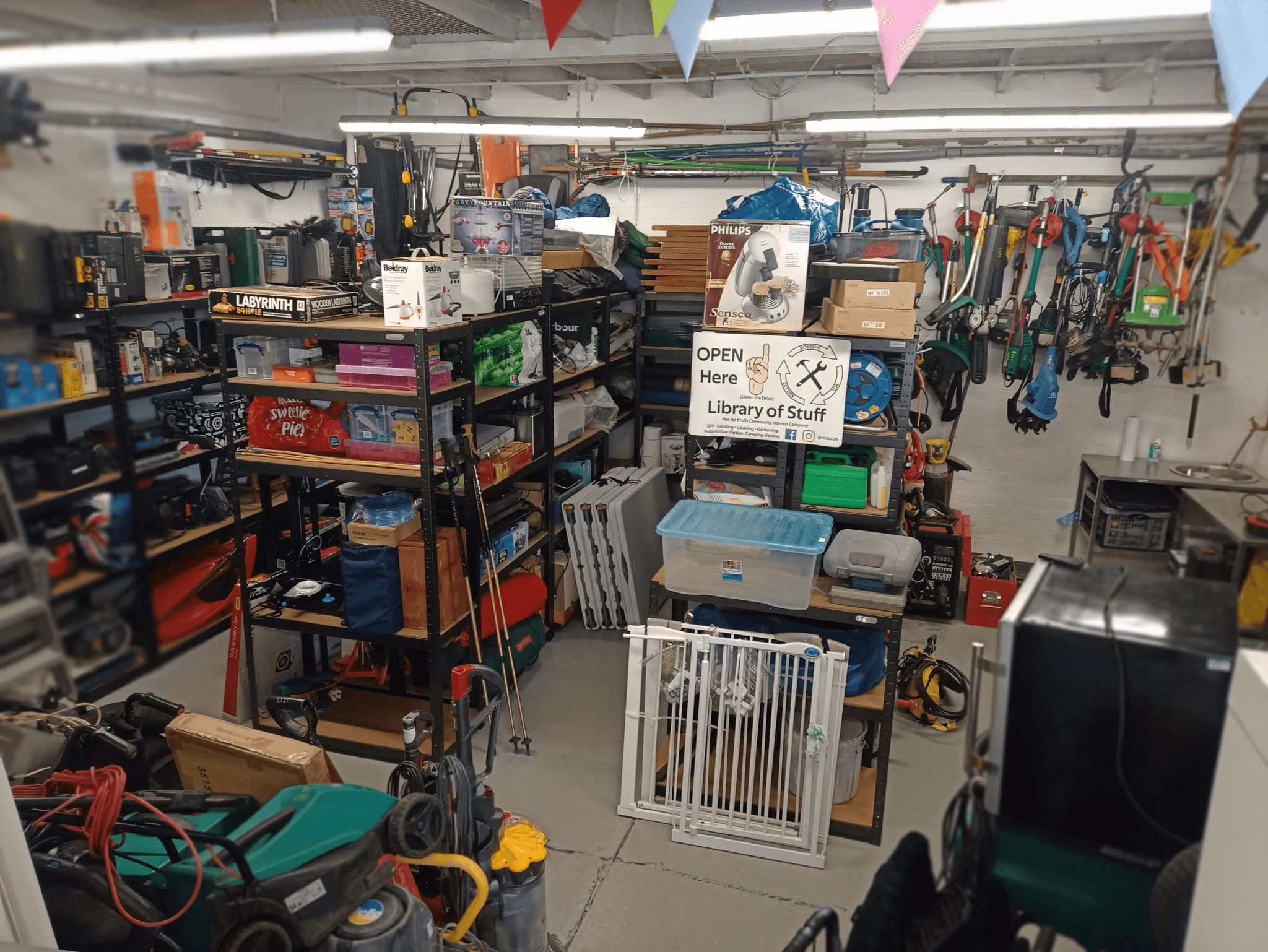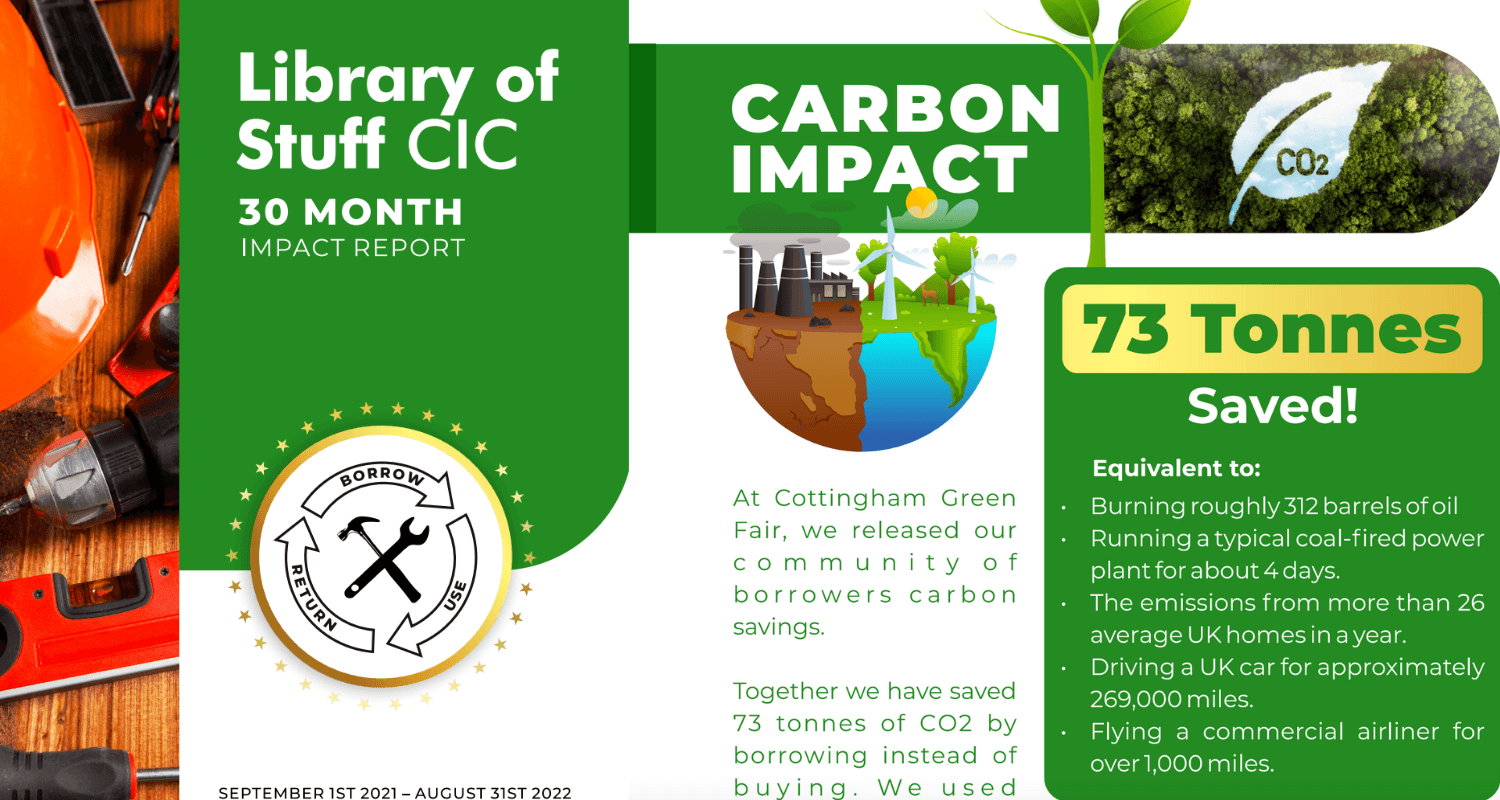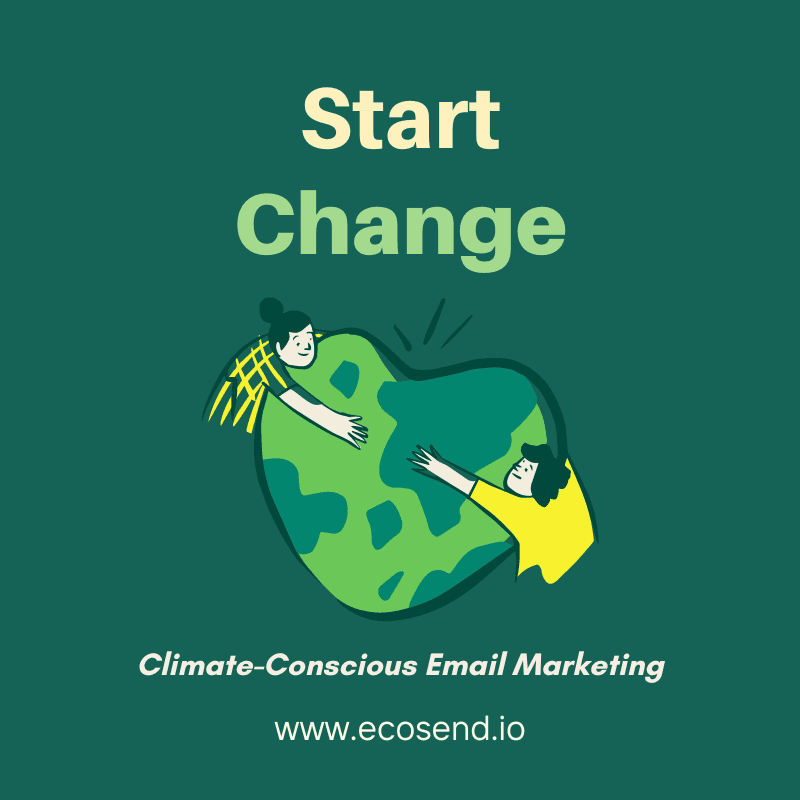So you need to strip old floors, install shelves or deep clean your carpets.
When it comes to these types of household tasks, we normally have to purchase the tools we need to get the job done.
But with household consumption responsible for 72% of global greenhouse gas emissions (ScienceDirect) - the things we have lying around our homes but don't really use more than once are a huge problem for the environment.
Library Of Stuff is a new venture in Hull, England that’s better for the planet and your pocket.
Instead of borrowing books at this library, you borrow ‘stuff’ - basically anything you need around the home for those specialist jobs. With everything available for a small fee, the items are then returned as soon as you’re done similar to how a traditional library works.
Here at EcoSend, we want to shine a light on inspiring ideas that help solve the climate crisis.
Library Of Stuff is one such venture that's caught our eye.
Library Of Stuff - How It Works

Library Of Stuff is known as a sharing library.
In the UK alone, sharing libraries are a growing movement that focus on sustainability and community.
In the case of Hull’s Library Of Stuff, local residents can borrow rather than have to buy the likes of carpet cleaners, hedge trimmers and power drills. Not only does the idea save people money, but by borrowing instead of buying that item, it’s much better for the planet too.
The founder of Library Of Stuff is Alan Dalgairns. His idea continues to go from strength to strength, with recent features on various TV and news programs. The venture was also recently crowned Social Enterprise Startup of the Year.
At present, Library Of Stuff has over 1,300 members made up of people in the local community.
With every item borrowed, the need to manufacture, store and transport goods is reduced. If you consider how many delivery trucks we see on the road each day, the uptake of sharing libraries elsewhere in the UK could have an incredibly positive benefit for the climate crisis.
Furthermore, when items start to degrade they are repaired rather than replaced, boosting the green credentials of the Library Of Stuff even more. The company slogan ‘borrow, use, return’ ties in with this mantra.
Read more: The Library Of Stuff Impact Report
Buying Stuff For Our Homes Drives Climate Change - Why Sharing Libraries Offer A Sustainable Solution

A poll of 2,000 adults was conducted as part of a sustainability study by John Lewis Partnership.
It found that 58% of people said the environment “doesn’t even cross their mind” when purchasing household items.
Often when buying anything for our homes, we take the time to research the brand name, the materials or even the cost.
But does anyone stop to consider the lifecycle of that product, and its impact on the climate?
Sharing libraries such as Hull’s Library Of Stuff is an easy way to reduce the CO2 produced by our household goods, as the items are borrowed rather than purchased.
Here are where these CO2 and waste reductions can be felt.
Material Sourcing & Production

Reusing the same item rather than mass manufacturing could significantly lower CO2 emissions.
The founder of Library Of Stuff mentions in the above clip that a power drill “may only be used for 30 minutes in its entire life”. The rest of the time that drill is sitting in a garage somewhere.
All the while, your neighbour might be purchasing the same drill for their own project while yours sits unused. It just doesn’t make sense, especially in terms of the impact on the climate.
How sharing libraries help: When fewer items are in circulation, it means that the original production process doesn’t need to be continually repeated, reducing CO2 emissions as a result.
💡🌳 You may be interested in: 11 Green Construction & Home Renovation Trends For 2023
Shipping & Distribution

Global shipping is responsible for 3% of worldwide greenhouse gas emissions - European Commission
Take a look at any of the items in your home such as furniture, household tools or even clothes and rarely do they state they are made in the UK.
In fact, the UK is responsible for just 1.8% of the global manufacturing output.
Instead, the top countries for manufacturing include China (28.4%), the United States (16.6%) and Japan (7.2%).
When everything in our homes has had to travel thousands of miles by sea, air or land to reach us, this creates inevitable carbon emissions from shipping these goods to the distribution centre and then to our homes.
Plus, many items may also be returned generating yet more CO2.
How sharing libraries help: Customers only borrow an existing item, rather than that item having to be shipped in from across the world as new. This removes lorries from our roads.
Clutter (Which Usually Ends Up In Landfill)

90% of the UK population has a problem with clutter in their home - Access Box Storage.
At some point, everything we own will likely end up in landfill.
House clearances after someone has passed away are one such example. It’s not something most of us ever want to think about. But after we’ve gone, where will all of our stuff end up?
If our possessions aren’t sorted in advance they will likely end up a giant skip and be taken to the tip. For instance, when someone purchases a ‘doer upper’ home, all of its contents have to be stripped out including furniture and personal possessions. All of these items once belonged to someone, but to someone else are merely seen as 'junk'.
Even while living in a home, if it’s full of stuff you’ll never use, it can actually have a negative impact on our health. Plus, clutter represents wasted money on items that aren’t being used.
How sharing libraries help: They give you the ability to stop buying anything other than the essentials for your home since you can borrow anything else you need for a short-term project. All of which reduces clutter as part of a more minimalist lifestyle. This then has a positive impact on reducing items sent to landfill too.
EcoSend - Email Marketing That’s Better For The Planet

With your household clutter taken care of due to excellent ideas like Hull's Library Of Stuff - how about cleaning up your email marketing campaigns?
EcoSend is the world’s first sustainable email marketing platform. Our systems run on renewable energy sources, and we plant trees on behalf of your business.
If you’re a business that uses email to market its products and services, then switching to EcoSend could reduce your CO2 emissions.
➡️ ✉️ 🌳 Sign up for your free EcoSend trial to get started.
Or, want to learn more about EcoSend? Check out our blog or give us a follow on Twitter.
If you have questions about switching your business email platform over to EcoSend, please drop us a message (this will take you to our GoSquared help portal) and we’ll be in touch.



